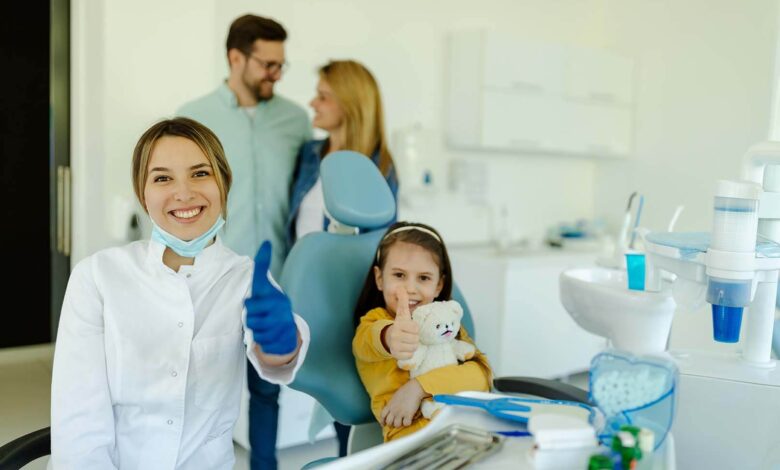The Role of Preventive Care in Family Dentistry: From First Visits to Long-Term Smiles

Introduction
There’s a common misconception that dental visits are only necessary when something hurts. But the reality is that the most effective oral care happens before problems start. Preventive care is the foundation of healthy teeth and gums—and in the world of family dentistry, it’s the thread that connects oral health across generations.
Preventive dentistry goes beyond the basic cleaning. It includes education, screenings, and proactive strategies tailored to each family member’s age and risk level. When embraced early and consistently, it helps avoid more serious treatments later and builds positive relationships with dental health for life.
Here’s how preventive care plays a critical role from baby teeth to senior smiles—and why it should be central to every family’s dental plan.
Starting Early: The Pediatric Advantage
The sooner dental care begins, the better the outcome. Pediatric preventive care lays the groundwork for healthy adult habits, helping children become comfortable in the dentist’s chair and setting expectations for routine oral hygiene.
Key components of preventive care in young children include:
- First dental visit by age one to establish comfort and baseline health
- Fluoride applications to strengthen developing enamel
- Sealants to protect molars from decay
- Guidance for parents on brushing techniques and diet choices
- Monitoring oral habits, such as thumb-sucking or pacifier use
Preventive dentistry in children is not just about teeth—it’s about development. Jaw alignment, speech clarity, and spacing are all monitored to ensure proper growth.
Consistency Through the School Years
As children grow, their oral care needs become more complex. While baby teeth fall out, the arrival of permanent teeth brings new opportunities—and risks.
Preventive strategies during this phase often include:
- Biannual checkups to assess tooth alignment and identify early decay
- X-rays to monitor root development and detect hidden issues
- Reinforcement of flossing and brushing habits as independence increases
- Nutritional advice to limit sugary drinks and processed snacks
- Athletic mouthguards for kids involved in contact sports
This stage is where long-term habits are truly shaped. A strong relationship with a family dentistry provider helps ensure these lessons stick—especially when supported by familiar faces and consistent routines.
Teens and Transitions: Risk Awareness and Responsibility
Teenagers are gaining independence in all areas of life—including dental care. But this newfound freedom comes with challenges. Orthodontic appliances, poor dietary choices, and social pressures can lead to lapses in hygiene.
Prevention in teen years focuses on:
- Monitoring for gum inflammation, especially around braces
- Evaluating wisdom teeth development and planning removals when necessary
- Addressing cosmetic concerns early to support confidence
- Counseling on smoking, vaping, or oral piercings
- Continued education on the impact of energy drinks, snacks, and sleep on oral health
These visits also reinforce the importance of maintaining good habits despite a busy schedule—something many teens struggle with as academics and social lives intensify.
Adults: Managing Stress and Maintenance
For many adults, the goal of preventive dental care shifts from building habits to maintaining stability. However, this life stage introduces its own stressors—workload, family responsibilities, and emerging health conditions—all of which can affect oral health.
Key preventive priorities for adults include:
- Routine cleanings and exams every six months
- Monitoring for early signs of gum disease
- Detecting grinding and clenching due to stress or sleep issues
- Oral cancer screenings during regular checkups
- Restorative assessments to maintain older fillings or crowns
Adults may feel they don’t have time for dental appointments, but skipping them often leads to more complex (and expensive) treatments down the road.
Seniors: Comfort, Function, and Longevity
In older adults, preventive care focuses on preserving comfort, avoiding complications, and supporting overall health. Issues like dry mouth, bone loss, and mobility limitations require more tailored strategies.
For seniors, preventive dentistry may involve:
- Frequent cleanings to address gum recession or buildup
- Monitoring dentures and bridgework for fit and wear
- Managing dry mouth caused by medication
- Supporting jawbone health after tooth loss
- Identifying early signs of oral cancers or infections
Ongoing care helps ensure that dental health doesn’t become a barrier to nutrition, speech, or confidence. Seniors benefit greatly from a trusted dental home that understands how aging affects oral function.
The Value of a Continuous Care Model
When each family member visits the same practice over time, their care becomes more proactive, personal, and strategic. Dental providers get to know the patient’s full history—making it easier to detect subtle changes and deliver timely interventions.
Benefits of continuous preventive care include:
- Early detection of problems before they become painful or expensive
- Less time missed from school or work due to emergencies
- Personalized advice based on evolving needs and family trends
- Opportunities for cross-generational education and support
- A sense of trust and comfort in a familiar setting
Practices like Cloverdale Dental Centre understand that preventive care is not a one-size-fits-all approach—it’s a dynamic partnership that evolves with the family’s needs.
Supporting Prevention at Home
While professional care is crucial, much of preventive dentistry happens at home. Families can work together to build oral care routines that complement their visits and reinforce dentist-recommended practices.
At-home prevention tips:
- Create consistent brushing and flossing habits for all ages
- Encourage water consumption and limit sugary snacks
- Replace toothbrushes every three months
- Use age-appropriate dental products for kids and seniors
- Keep hygiene tools accessible and travel-ready
- Maintain open conversations about fears or challenges related to oral care
The more aligned the home and dental office are, the stronger the results.
Final Thoughts
Preventive care is the silent hero of oral health. It may not grab headlines like dramatic procedures or cosmetic transformations, but it’s the key to lifelong dental success. In a family dentistry model, preventive care becomes even more powerful—because it connects education, habits, and health across every age.
Whether it’s a toddler’s first cleaning or a grandparent’s denture adjustment, the philosophy is the same: identify issues early, manage risks wisely, and empower patients with knowledge.
With a trusted provider by their side, families can enjoy not only brighter smiles—but fewer surprises, better outcomes, and greater confidence in every stage of life.




